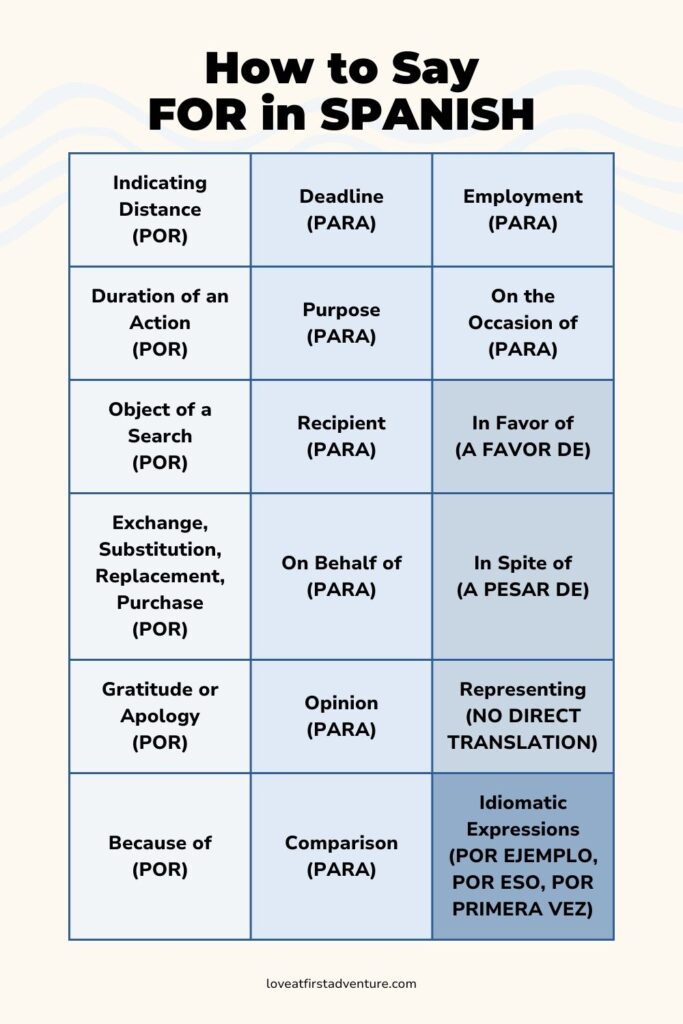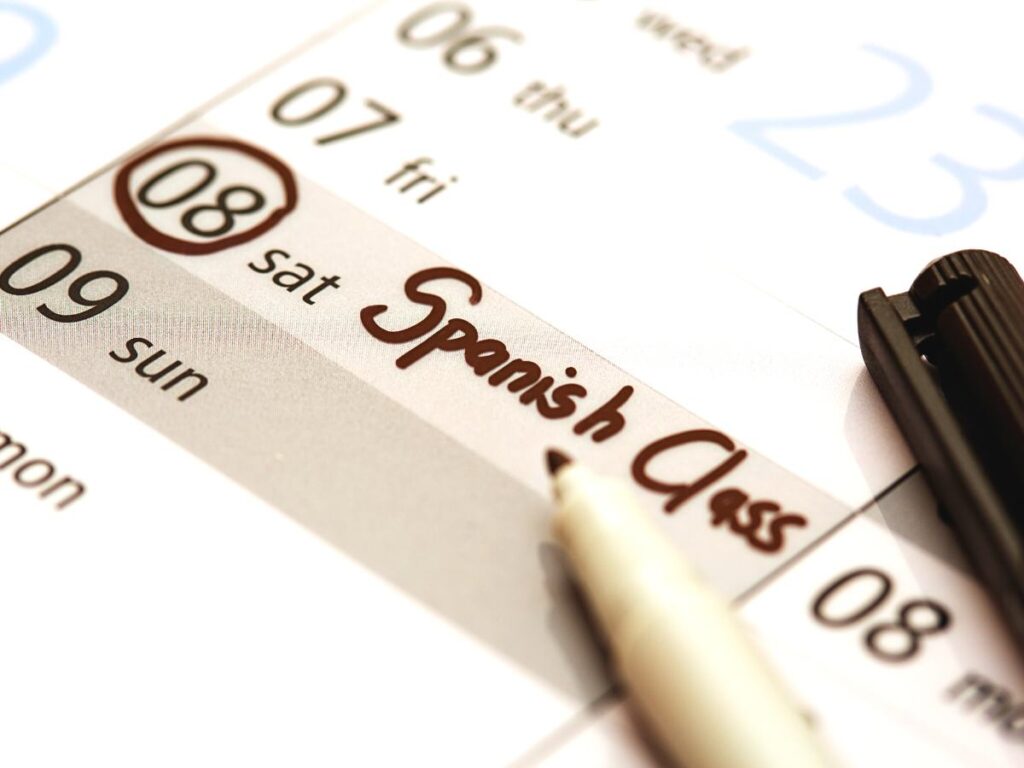How to Say For in Spanish: Por, Para, or Something Else?
One question that often comes up when studying the Spanish language surroundings how to say the word “for” in Spanish. Unfortunately, it’s not as easy as a simple one-word translation!
In fact, “for” has several translations, depending on exactly what you want to say. You may not have thought about it but, as a preposition, “for” is used in many different ways in English.
So, you’ll have to think through what meaning you’re trying to get across to get it right.
Now, the most common Spanish words for “for” are por or para. But wait, it gets even more complicated—por and para each have multiple uses!
Of course, if you make a mistake when conversing with a native Spanish speaker, you’ll generally be understood. But, I know that you’re working to become proficient in Spanish and want to get it right.
So, don’t worry. I’m a former Spanish Teacher. I’m going to explain everything you need to know to say “for” in Spanish correctly so that you can speak Spanish with confidence!

Brief Overview: How to Say “For” In Spanish
First things first, the English word “for” in the dictionary has over 10 uses. So, using the word “for” in Spanish isn’t just a one-word translation. How you translate “for” will depend on these uses.
However, in general, two words mean for in Spanish. These words are por and para. (For reference, the pronunciation of these is pour and pah-rah, respectively.)
I’ve put together this quick chart with all the uses of “for”, the translation in Spanish, and sample sentences in English and Spanish.
| Use of “For” | “For” in Spanish | English Example | Spanish Example |
| Indicating Distance | por | We walked for ten miles. | Caminamos por diez millas. |
| Duration of an Action | por | We studied for two hours. | Estudiamos por dos horas. |
| Object of a Search | por | Anita went to the kitchen for the salad. | Anita fue a la cocina por la ensalada. |
| Exchange, Substitution, Replacement, Purchase | por | I make dinner for my mom when she works. | Hago la cena por mi mama cuando trabaja. |
| Gratitude or Apology | por | Thanks for your help. | Gracias por su ayuda. |
| Because of | por | Mario is known for his sense of humor. | Mario es conocido por su sentido del humor. |
| Deadline | para | Diego will complete his project for tomorrow. | Diego va a cumplir su proyecto para mañana. |
| Purpose | para | Alberto bought food for the week. | Alberto compró comida para la semana. |
| Recipient | para | The teacher brings sweets for the children. | La maestra trae dulces para los niños. |
| On Behalf of | para | He plays for Manchester United. | Juega para el Manchester United. |
| Opinion | para | For me, the class is very easy. | Para mí, la clase es muy fácil. |
| Comparison | para | For a 5-year-old, he is very smart. | Para un niño de cinco años, él es muy inteligente. |
| Employment | para | My mom works for a lawyer. | Mi mamá trabaja para un abogado. |
| On the Occasion of | para | What are you doing for Easter? | ¿Qué vas a hacer para Pascua? |
| In Favor of | a favor de | Not many people are for working in office. | No hay mucha gente que esté a favor de trabajar en una oficina. |
| In Spite of | A pesar de | For all the problems we faced, we did well in the end. | A pesar de todos los problemas que enfrentamos, al final lo hicimos bien. |
| Representing | No direct translation | What’s Spanish for friendly? | ¿Qué significa amistoso en español? |
| Idiomatic Expressions | por ejemplo, por eso, por primera vez | For example, we invested $500 last year. | Por ejemplo, el año pasado invertimos 500 dólares. |
I hope you found this chart with the meanings of “for” in Spanish helpful. But just like saying, “It’s delicious” in Spanish, it’s just the tip of the iceberg!
Keep scrolling for the exact uses with examples!
17 Ways to Say “For” in Spanish
If you would like to say, “for” in Spanish, scroll down to see 17 different uses of the word!
1. To Indicate Distance (Por)
When expressing the concept of length, span, or distance in Spanish, use the word “por.”
Here are some example sentences:
- We walked for ten miles. (Caminamos por diez millas.)
- They drove for five hundred kilometers. (Condujeron por quinientos kilómetros.)
- The river flows for many miles through the valley. (El río fluye por muchas millas a través del valle.)
2. Duration of an Action (Por)
In Spanish, when we want to talk about the duration of an action—that is, how long something lasts—we use “por.“
Note that “por” is used to give a sense of the period or length of time, rather than a specific start or end time. This distinction is important for expressing durations clearly in Spanish.
Example Sentences:
- We studied for two hours. (Estudiamos por dos horas.)
- She slept for eight hours last night. (Durmió por ocho horas anoche.)
- They played football for the whole afternoon. (Jugaron al fútbol por toda la tarde.)
3. Object of a Search (Por)
When expressing the object of a search in Spanish, “por” is the preposition used. This aligns closely with the English usage of “for” or “in search of” in similar contexts.
If you’re looking for an item, a person, or even an abstract concept, “por” is word to use!
Example Sentences:
- Lena went to the kitchen for the food. (Lena fue a la cocina por la comida.)
- I searched everywhere for my keys. (Busqué por todas partes mis llaves.)
- She is in the market for a new car. (Ella está buscando por un coche nuevo.)
4. Exchange, Substitution, Replacement, Purchase (Por)
Whether it’s trading items, substituting one thing for another, doing something instead of someone else, or specifying what is given in return for a purchase, “por” is the Spanish word for “for” to use.
Example Sentences:
- I make dinner for my dad when he works. (Hago la cena por mi papá cuando trabaja.)
- I give gum in exchange for candy. (Yo doy chicle por dulces.)
- My dad pays you twenty dollars for his work. (Mi papá te paga veinte dólares por su trabajo.)
- Could you tell him for me? (¿Podrías decírselo por mí?)

5. Gratitude or Apology (Por)
“Por” is the correct translation for “for” in Spanish when thanking someone, expressing appreciation, or making an apology.
Example Sentences:
- Thanks for your help. (Gracias por tu ayuda.)
- I apologize for the inconvenience. (Pido disculpas por las molestias.)
- She thanked him for the gift. (Le agradeció por el regalo.)
- I’m sorry for being late. (Lo siento por llegar tarde.)
6. Because of (Por)
The preposition “por” is used in Spanish to express the cause or reason behind something, similar to the English “because of.”
It’s good to know this when you want to explain the ‘why’ of a situation or the rationale behind an action.
Example Sentences:
- He’s known for his bad temper. (Es conocido por su mal humor.)
- The game was canceled because of the rain. (El juego fue cancelado por la lluvia.)
- She’s respected for her honesty. (Es respetada por su honestidad.)
- The event was postponed because of unforeseen circumstances. (El evento fue pospuesto por circunstancias imprevistas.)
7. Deadline (Para)
In Spanish, when referring to a deadline for tasks, events, or goals, “para” is used. This corresponds to “by” or “for” in English.
Example Sentences:
- Mercedes bought the cake for Friday. (Mercedes compró el pastel para el viernes.)
- The report is due for Monday. (El informe es para el lunes.)
- They need to finish the work by the end of the week. (Necesitan terminar el trabajo para el fin de semana.)
8. Purpose (Para)
When you want to say “for” in contexts where you describe why something is done or for what reason, the translation will be “para.” (This can refer to objects, actions, or situations.)
Example Sentences:
- Alberto bought food for the week. (Alberto compró comida para la semana.)
- It’s a tire for the car. (Es una llanta para el coche.)
- This tool is for cutting metal. (Esta herramienta es para cortar metal.)
- The book is for my Spanish class. (El libro es para mi clase de español.)

9. Recipient (Para)
In Spanish, when saying who an action is done for, or an object is for, “para” is the preposition of choice.
Example Sentences:
- The teacher brings sweets for the children. (La maestra trae dulces para los niños.)
- My dad buys flowers for my mom. (Mi papá compra flores para mi mamá.)
- This gift is for you. (Este regalo es para ti.)
- The message was intended for the manager. (El mensaje era para el gerente.)
10. On Behalf Of (Para)
Similar to the English phrase “on behalf of,” this usage of “para” conveys the idea of representing someone, acting in their interest, or as their proxy.
Example Sentences:
- She spoke for the team. (Habló para el equipo.)
- The lawyer argued for his client. (El abogado argumentó para su cliente.)
- He signed the document for his company. (Firmó el documento para su empresa.)
11. Opinion (Para)
If you want to express a personal opinion or viewpoint, use “para” as in “For me…”. This usage helps to clarify that the statement reflects a personal perspective or subjective opinion.
Example Sentences:
- For you, keeping secrets is very important. (Para ti, guardar los secretos es muy importante.)
- For her, traveling is more than a hobby. (Para ella, viajar es más que un pasatiempo.)
- In his opinion, the book is quite interesting. (Para él, el libro es bastante interesante.)
12. Comparison (Para)
Translating to phrases like “for” or “considering” in English, you can use the word “para” to contextualize something within specific conditions, relation, or in comparison to others.
Example Sentences:
- For a clown, he is not very funny. (Para ser un payaso, no es muy cómico.)
- For such a small town, it has many attractions. (Para un pueblo tan pequeño, tiene muchas atracciones.)
- Considering her age, she’s an excellent runner. (Para su edad, es una corredora excellent.)

13. Employment (Para)
In Spanish, when talking about employment or the organization for which someone works, “para” is used. This is almost the same as the English use of “for.”
Example Sentences:
- I work for a big company. (Yo trabajo para una gran empresa.)
- He’s been working for the same company for years. (Ha estado trabajando para la misma empresa durante años.)
- She volunteers for a non-profit organization. (Ella hace voluntariado para una organización sin fines de lucro.)
14. On the Occasion of (Para)
In Spanish, “for” is also used to talk about actions or events that are planned for specific occasions or purposes by using the word “para.”
Example Sentences:
- We had chicken for lunch. (Comimos pollo para el almuerzo.)
- They’re preparing a party for her birthday. (Están preparando una fiesta para su cumpleaños.)
- I bought a new dress for the wedding. (Compré un vestido nuevo para la boda.)
15. In Favor of (A favor de)
Sometimes we use “for” to mean “in favor of.” This is like saying, “I’m for [something]”. It indicates that we agree with an idea, a person, a policy, or any other entity or concept. In this case, use “a favor de” rather than the more widely-used “por” or “para.”
Example Sentences:
- Not many people would be for a recall election.. (No mucha gente estaría a favor de una elección revocatoria.)
- I am all for the new environmental policy. (Estoy a favor de la nueva política ambiental.)
- The committee voted for the proposal. (El comité votó a favor de la propuesta.)
16. In Spite of (A pesar de)
In Spanish, “a pesar de” is used to express a concept similar to the English phrase “in spite of” or “despite.” This can sometimes use the word “for” in English. It indicates that an action, event, or state occurs regardless of factors that could hinder it.
Example Sentences:
- For all the challenges she encountered, she still succeeded. (A pesar de todos los desafíos que encontró, aún así lo logró.)
- For all the rain today, the event was well-attended. (A pesar de la lluvia de hoy, el evento contó con una gran asistencia.)
17. Representing (No direct translation)
In Spanish, when conveying the idea of something representing or standing for something else, there isn’t always a direct equivalent of the English “for.” Instead, various phrases or constructions are used depending on the context.
Example Sentences:
- What’s Spanish for “yellow”? (¿Cómo se dice “amarillo”’ en español?)
- The red rose stands for love. (La rosa roja representa el amor.)
- In this equation, x stands for the unknown variable. (En esta ecuación, x representa la variable desconocida.)

For in Idiomatic Expressions in Spanish
Idiomatic expressions, which exist in most if not all languages, are phrases where the meaning isn’t literal. Sometimes, it’s not even obvious!
These phrases are often used frequently in everyday conversation, often conveying ideas or concepts that are reflective of the culture. Understanding them is one of the keys to achieving fluency in a language, as well.
There are a couple of idiomatic expressions that use the word “for,” with pretty straightforward meanings. We’ll look at them in this section.
Por Ejemplo (For Example)
“Por ejemplo” is an expression in Spanish that is directly equivalent to “for example” in English. I’m sure you’ve used this yourself to clarify a statement, propose a possibility, or provide a specific instance to explain your point.
Example Sentences:
- We can meet at the café, for example. (Podemos encontrarnos en el café, por ejemplo.)
- For a healthy diet, you could eat fruits and vegetables, for example. (Para una dieta saludable, podrías comer frutas y verduras, por ejemplo.)
- He likes to play sports, soccer for example. (Le gusta practicar deportes, el fútbol por ejemplo.)
Por Eso (For That Reason)
The phrase “por eso” in Spanish means “for that reason” or “therefore” in English. It’s used to draw a conclusion or to explain the cause behind an action or a situation.
Literally, it translates to “For that” in English.
Example Sentences:
- It was raining, for that reason we stayed home. (Estaba lloviendo, por eso nos quedamos en casa.)
- She won the award, for that reason she’s very happy. (Ganó el premio, por eso está muy contenta.)
- He missed the bus, for that reason he was late. (Perdió el autobús, por eso llegó tarde.)
Por Primera Vez (For the First Time)
The expression “por primera vez” in Spanish is directly equivalent to “for the first time” in English. Just as in English, it’s used to describe an action, event, or experience happening for the first time.
Example Sentences:
- I tried sushi for the first time yesterday. (Probé sushi por primera vez ayer.)
- She visited Europe for the first time this summer. (Visitó Europa por primera vez este verano.)
- They are going to live abroad for the first time. (Van a vivir en el extranjero por primera vez.)
Conclusion: How to Say For in Spanish
If you came to this blog wondering, What is, “for” in Spanish, I hope you’ve found everything you need to know in this blog post. Now, you can speak with confidence the next time you visit a Spanish-speaking country!
Click the image below to save to Pinterest!


